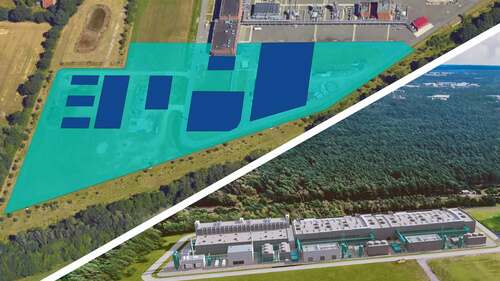German and state governments grant funding for large hydrogen projects by RWE at Lingen, Germany
Essen - The German government and federal state governments confirmed that funding of over 619 million euros has been granted to implement two of RWE’s large hydrogen projects.
The funds will be provided for the construction of a 300-MW electrolyser to generate green hydrogen in Lingen (Lower Saxony) as part of the GET H2 Nukleus project as well as a hydrogen facility in Gronau-Epe (North Rhine-Westphalia).
A third strand of funding has been granted to a consortium developing a 100-MW electrolyser plant at the port of Rostock (Mecklenburg-Western Pomerania) as part of the HyTechHafen Rostock project. RWE is a member of this consortium.
The federal government is providing 70% of the total funding for each of the projects. The states of Lower Saxony, North Rhine-Westphalia, and Mecklenburg-Western Pomerania are contributing 30% to the venture on their respective territories. RWE is planning to invest a medium three-digit million-euro amount in the three projects.
Markus Krebber, CEO of RWE AG: “Today is a great day for the ramp-up of the hydrogen economy. Thanks to the funding from the German government and the federal state governments, the first industrial-scale hydrogen projects in Germany can now be implemented. Green electricity and hydrogen will be crucial in terms of making locations attractive to industry. It is thus vital to also invest in electrolysers producing hydrogen in Germany and the associated infrastructure including storage facilities without delay. Our Team RWE has worked tirelessly to drive our hydrogen projects forward – it is great to see that they are getting off the ground now.”
The EU Commission recognised the projects as Important Projects of Common European Interest (IPCEI) in February, together with other hydrogen schemes. This made it possible for national bodies to grant funding.
Germany’s Minister for Economic Affairs and Climate Action and representatives from the federal states presented the funding notifications in Berlin on Monday.
The Lingen site plays a key part in RWE’s hydrogen strategy. There, the company wants to install hydrogen generating capacities of 300 megawatts in 100-megawatt increments by 2027 as part of the GET H2 Nukleus project. The first 100-MW electrolyser is to be commissioned in 2025. Green hydrogen produced in Lingen will help industrial companies to significantly reduce their carbon emissions.
Transport and storage infrastructure will play a crucial role in the ramp-up of the hydrogen economy. Two caverns will be used for storing hydrogen in RWE Gas Storage West’s planned facility in Gronau-Epe. The storage plant is aimed at balancing out the fluctuations in hydrogen generation using wind and solar energy. In this way hydrogen can be supplied to industrial customers as required by the companies. The first hydrogen is to be stored at the facility in 2026.
A 100-MW electrolyser will be constructed at Rostock port as part of the HyTechHafen Rostock project and will produce green hydrogen from 2027. Some of the hydrogen is intended to supply local consumers, the rest to be fed into the Germany-wide hydrogen core grid that is currently being developed. The operating company is a joint venture of ROSTOCK PORT GmbH, RheinEnergie AG, EnBW Neue Energien AG, and RWE Generation SE.
Categories
Countries
Companies
Latest news
UPM receives triple sustainability certification for the Leuna biorefinery
Leuna Chemical Complex →The Leuna biorefinery is the world’s first industrial-scale facility of its kind, converting wood into advanced biochemicals at scale. This milestone reinforces UPM’s role as a frontrunner in susta...
On stream: BASF starts up new world-scale plant for hexamethylenediamine in Chalampé, France
Increase of BASF’s HMD production capacity to 260,000 metric tons Expansion of polyamide business together with polyamide 6.6 production in Freiburg
Biogas and e-SAF Business Joint Venture Established with Denmark's Skovgaard Energy
A new company engaged in the development of renewable energy to produce biogas and Power to X (*1) business such as e-SAF (*2). The new company aims to produce around 40 million Nm³ (*3) of biogas ...
BASF starts commercial operation of Black Mass plant for Battery Recycling in Schwarzheide, Germany
It is one of the biggest commercial Black Mass plants in Europe, with an annual processing capacity of up to 15,000 tons of end-of-life lithium-ion batteries and production scrap. This equals rough...

